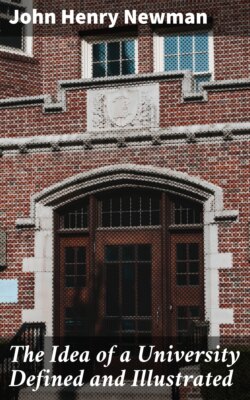Читать книгу The Idea of a University Defined and Illustrated - John Henry Newman - Страница 46
На сайте Литреса книга снята с продажи.
11.
ОглавлениеTable of Contents
But now let us turn to the teaching of the actual Political Economist, in his present fashionable shape. I will take a very favourable instance of him: he shall be represented by a gentleman of high character, whose religious views are sufficiently guaranteed to us by his being the special choice, in this department of science, of a University removed more than any other Protestant body of the day from sordid or unchristian principles on the subject of money-making. I say, if there be a place where Political Economy would be kept in order, and would not be suffered to leave the high road [pg 089] and ride across the pastures and the gardens dedicated to other studies, it is the University of Oxford. And if a man could anywhere be found who would have too much good taste to offend the religious feeling of the place, or to say any thing which he would himself allow to be inconsistent with Revelation, I conceive it is the person whose temperate and well-considered composition, as it would be generally accounted, I am going to offer to your notice. Nor did it occasion any excitement whatever on the part of the academical or the religious public, as did the instances which I have hitherto been adducing. I am representing then the science of Political Economy, in its independent or unbridled action, to great advantage, when I select, as its specimen, the Inaugural Lecture upon it, delivered in the University in question, by its first Professor. Yet with all these circumstances in its favour, you will soon see, Gentlemen, into what extravagance, for so I must call it, a grave lawyer is led in praise of his chosen science, merely from the circumstance that he has fixed his mind upon it, till he has forgotten there are subjects of thought higher and more heavenly than it. You will find beyond mistake, that it is his object to recommend the science of wealth, by claiming for it an ethical quality, viz., by extolling it as the road to virtue and happiness, whatever Scripture and holy men may say to the contrary.
He begins by predicting of Political Economy, that in the course of a very few years, “it will rank in public estimation among the first of moral sciences in interest and in utility.” Then he explains most lucidly its objects and duties, considered as “the science which teaches in what wealth consists, by what agents it is produced, and according to what laws it is distributed, [pg 090] and what are the institutions and customs by which production may be facilitated and distribution regulated, so as to give the largest possible amount of wealth to each individual.” And he dwells upon the interest which attaches to the inquiry, “whether England has run her full career of wealth and improvement, but stands safe where she is, or whether to remain stationary is impossible.” After this he notices a certain objection, which I shall set before you in his own words, as they will furnish me with the illustration I propose.
This objection, he says, is, that, “as the pursuit of wealth is one of the humblest of human occupations, far inferior to the pursuit of virtue, or of knowledge, or even of reputation, and as the possession of wealth is not necessarily joined,—perhaps it will be said, is not conducive,—to happiness, a science, of which the only subject is wealth, cannot claim to rank as the first, or nearly the first, of moral sciences.”9 Certainly, to an enthusiast in behalf of any science whatever, the temptation is great to meet an objection urged against its dignity and worth; however, from the very form of it, such an objection cannot receive a satisfactory answer by means of the science itself. It is an objection external to the science, and reminds us of the truth of Lord Bacon's remark, “No perfect discovery can be made upon a flat or a level; neither is it possible to discover the more remote and deeper parts of any science, if you stand upon the level of the science, and ascend not to a higher science.”10 The objection that Political Economy is inferior to the science of virtue, or does not conduce to happiness, is an ethical or theological objection; the question of its “rank” belongs to that Architectonic [pg 091] Science or Philosophy, whatever it be, which is itself the arbiter of all truth, and which disposes of the claims and arranges the places of all the departments of knowledge which man is able to master. I say, when an opponent of a particular science asserts that it does not conduce to happiness, and much more when its champion contends in reply that it certainly does conduce to virtue, as this author proceeds to contend, the obvious question which occurs to one to ask is, what does Religion, what does Revelation, say on the point? Political Economy must not be allowed to give judgment in its own favour, but must come before a higher tribunal. The objection is an appeal to the Theologian; however, the Professor does not so view the matter; he does not consider it a question for Philosophy; nor indeed on the other hand a question for Political Economy; not a question for Science at all; but for Private Judgment,—so he answers it himself, and as follows:
